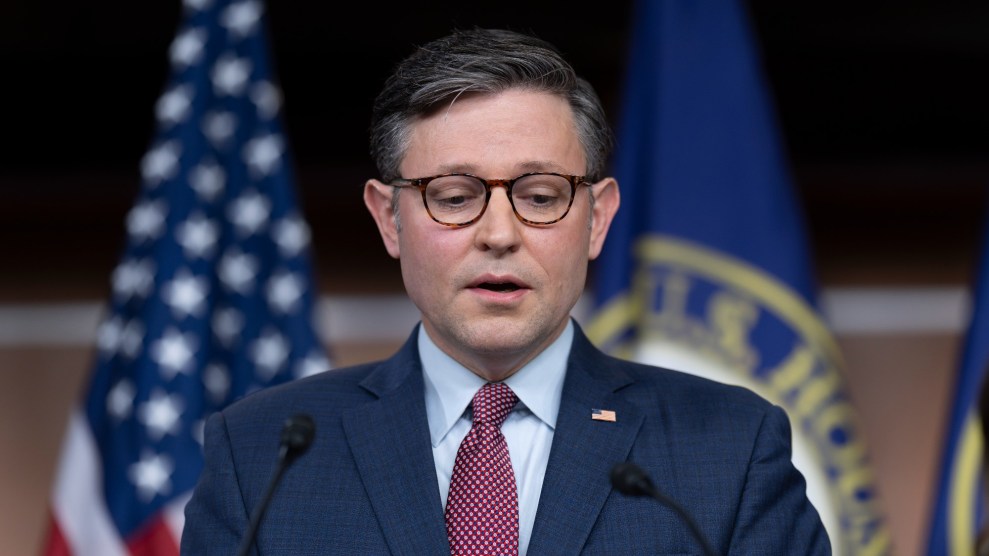
Speaker of the House Mike Johnson talks with reporters ahead of the debate and vote on supplemental aid to Israel.J. Scott Applewhite/AP
In his first major initiative as GOP House speaker, Mike Johnson pushed through a bill to provide $14 billion in military assistance to Israel. “Israel doesn’t need a cease-fire,” he declared before the vote. “It needs its allies to…deliver support now.” As the legislation heads to the Senate, it’s an appropriate moment to look back at a 2020 trip Johnson took to Israel, where he hobnobbed with far-right extremists.
In February of that year, Johnson traveled to Israel with Rep. Jim Jordan (R-Ohio). The sponsor for this trip was the New York-based 12Tribe Films Foundation, a small outfit that that describes itself as “online warriors for truth about Israel and the Jewish people.” The organization spent $34,520—about one-quarter of its revenue that year—to fly the two lawmakers and their wives to Israel and host them for the week-long trip. The itinerary included visits to the Golan Heights, Jerusalem, and Hebron, a city in the Israeli-occupied West Bank, as well as meetings with Israeli military officials, business owners, and political leaders—including Prime Minister Benjamin Netanyahu and other members of the right-wing Likud Party. The two congressmen also received a briefing from the Kohelet Policy Forum, a far-right Israeli think tank that would later help cook up the Netanyahu administration’s controversial plan to weaken the country’s judiciary. At the Golan Heights, the pair posed and smiled in front of a sign for Trump Heights, a new Israeli settlement in occupied territory claimed by Israel but that is widely considered to violate international law.
During the trip, Johnson observed, “You hear in the US about how the Palestinians or the Arab people are oppressed in these areas, and have these terrible lives. None of that is true. We didn’t see any of it.” According to the itinerary filed with the House Ethics Committee, the congressmen did not travel to Gaza or meet with Palestinian leaders or activists. (The Human Rights Watch 2020 report on Israel cited significant Israeli human rights violations related to Palestinians.)
Along for this ride was Avi Abelow, the director of 12Tribe Films Foundations. A New York-born Jew who lives in Jerusalem, Abelov is an arch-Zionist and a zealously religious supporter of Israel. He’s also a Temple Mount activist who has called for Jewish control of Haram-al-Sharif in the Israeli-occupied Old City of Jerusalem—the third holiest Islamic site in the world and the home of the Al-Aqsa Mosque and the Dome of the Rock. This site is also revered by Jews because they believe the First Temple and the Second Temple once stood there. Its Western Wall, also known as the Wailing Wall, is a famous site for Jewish prayer. For 266 years, under an agreement implemented during the Ottoman Empire, Jews have been allowed to visit the Temple Mount but not pray within its confines. (They can pray at the Western Wall outside the compound.) But some ultra-religious Jewish activists have fought to overturn that rule and have even attempted to violate it, waging prayer incursions on the site that have spurred Arab anger and triggered violence. Some Temple Mount activists have called for razing the Muslim structures there and building the Third Temple to usher in the coming of the Messiah. (To quicken the Messiah’s arrival, animal sacrifices would be held within it.)
During a visit to the Temple Mount in 2018, while Abelow was escorting another GOP congressional delegation, Jean Tipton, the wife of Rep. Scott Tipton (R-Colo.), suggested that Jews seize the Temple Mount and proclaim, “It’s ours. Always was, and it is again.” Abelow told her she was “correct,” but he noted that such a move was opposed by the Israeli government, which feared the tremendous trouble that would cause. Abelow said that he and others were trying to “generate the awareness necessary to prepare the Jewish people to be ready to then declare sovereignty” over the site.
Abelow has voiced hardline stances associated with the religious far-right in Israel. In 2008, during an interview with CNN, he appeared to express sympathy for West Bank settlers who engaged in violent action against Palestinians or Israeli soldiers (who forcibly dismantled settlements the Israeli government deemed illegal). “Unfortunately, there is always going to be a minority that’s going to lead to violence, but that’s because the system took away all the legal means,” Abelow argued. “When you take away all the legal means and people feel that they’re powerless at the hands of a democratic system, that leads individuals to take—to do things on their own hands.”
In a 2020 interview, Abelow rejected the idea of Israel conceding any land in the occupied territories to the Palestinians as part of a peace deal. “We don’t have the right to give away land that God gave to us…It’s not mine to give it away,” he said. “God gave it to me to protect for the future generation. How can I give it away?”
Abelow recently decried the massive protests in Israel against Netanyahu and his effort to weaken the Israeli judiciary, calling this movement a phony campaign orchestrated by “a tiny elite that hates their fellow, proud, traditional and religious Jews.” He added, “[T]oo many Jews today, on the political left, hate their fellow Jews more than they hate our actual enemies…They are doing everything they can to turn the public against the religious, and the ‘settlers.'”
Mother Jones sent emails to Abelow inquiring about his political views and the source of funding for Johnson and Jordan’s trip to Israel. He did not respond.
During Johnson and Jordan’s tour of Israel, Abelow escorted them to the various stops on the itinerary. On the fourth day, Johnson and Jordan visited Jerusalem’s Old City to see the Temple Mount. Their guide that morning was Yehuda Glick, an American-born rabbi and a far-right former Likud member of the Israeli Knesset. Glick, a settler activist, has been a leader in the Temple Mount movement. In 2014, he was shot and seriously injured by a Palestinian assailant.
Glick has long been tied to extremists. As a Knesset member in 2016, he agreed to speak at a memorial service for Meir Kahane, the Brooklyn-born Orthodox rabbi and religious zealot who founded the Jewish Defense League in the US and the Kach party in Israel, which called for removing Arabs from Israel. The FBI characterized Kahane’s JDL as “a violent extremist Jewish organization” that engaged in terrorism. Kahane’s Kach party was disqualified from participating in the 1988 elections in Israel under a law barring political parties that incite racism. Six years later, the Israeli government banned the Kach movement under its anti-terrorism laws. When asked about speaking at an event honoring Kahane, Glick at the time said, “You can participate in someone’s memorial without agreeing with their ideas.” He added, “Rabbi Meir Kahane accomplished a great deal, including helping to open up the gates of the Soviet Union for Jews [seeking to leave].” According to Jewish Currents, in 2017, Glick helped two leading Kahanists plan the “single largest Temple Movement incursion into Al-Aqsa to date.”
Glick has regularly led tour groups to Haram al-Sharif and instructed visitors to pray in defiance of the status quo agreement. As he guided Johnson and Jordan onto the site, he told them he would be praying “the whole time” and he pulled out a list of the names of people from around the world who had asked him to pray for them at the Temple Mount. He noted he would be offering a special prayer for the ailing daughter of a Texas pastor. Later in the day, Glick returned to the site and was arrested for allegedly violating the visiting rules and provoking Israeli police officers. Glick has tried to depict the Temple Mount issue as one of religious freedom—though many rabbis in Israel prohibit their followers from visiting it. Moreover, the Temple Mount, a Palestinian national symbol, is one of the most sensitive flashpoints in Jerusalem, and as Haaretz noted, it “continues to harness a volatile potential which could trigger a wider explosion.” (In the years afterward, Glick continued to lead Jews into the compound on provocative prayer incursions.)
This visit to Israel—Johnson’s second—seems to have influenced the future speaker’s views regarding the Israeli-Palestinian conflict. At the end of the visit, he and Jordan recorded a podcast with Abelow. Johnson gushed that he saw the trip “as the fulfillment of biblical prophecy—that we’re here at this time.” He said nothing about the problems faced by Palestinians. He claimed that from what he witnessed during these five days, the Palestinian and Israeli people were “working well together” and that there was a “great cohesion of the people” in the West Bank. He blamed “activists and the leftist groups” for “pushing” the narrative that there was conflict. He told Abelow, “We have to get so many other members of Congress to come and experience this.”


















